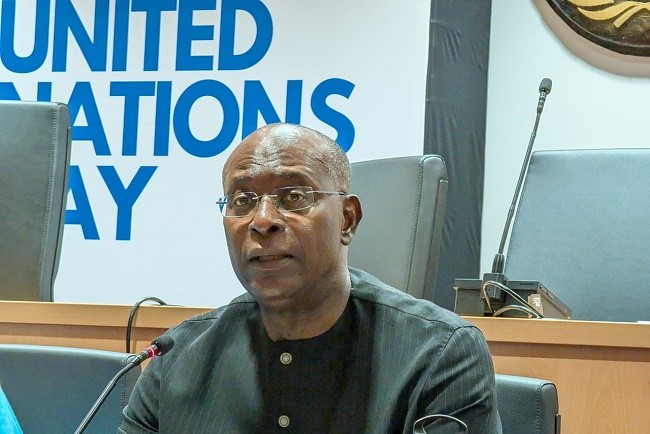The UN Resident and Humanitarian Coordinator in Nigeria, Mr. Mohammed Fall, has described the climate crisis as a human rights emergency, raising concerns over the future conditions in Sub-Sahara African countries.

Fall stated this at a-three-day 2025 Regional Africa Human Rights Academic Network Conference on environmental degradation and climate change justice on human rights in Abuja.
The conference is organised by the National Human Rights Commission (NHRC) in collaboration with the University of Nsukka (UNN) Raoul Wallenberg Institute (RWI).
The Regional African Human Rights Academic Network comprises institutions across the African continent, under the African Regional Programme of the Raoul Wallenberg Institute of Human Rights and Humanitarian Law (RWI).
It was first preceded in Harare, Zimbabwe October 2022, the second in Stellenbosch, Republic of South Africa in September 2023, the third, Abuja, Nigeria on February, 2025.
Fall said the gathering which is under the theme of Human Rights, Environment and Climate Change, Access to environment and climate justice within the regional and sub-regional human rights system in Africa, is apt.
“The climate crisis is more than environmental issues. It is a human rights emergency.
“Across our continent, rising temperatures, extreme weather events and environmental degradation is proportionally impacting those who are the most vulnerable.
“I mention the women, the elderly, the children, the youth and the persons with disabilities. Those who contribute least to the greenhouse emission are those who pay the heaviest price.
“This to us is an injustice,” he said.
Sub-Saharan Africa, he said, produces less than four per cent of the greenhouse emission, yet it suffers the worst effect of climate change.
This, he said, is more than an environmental injustice.
“It is a moral failure. The children of tomorrow will grow up in a climate, in a world, in an environment which is already damaged. This is a choice they have never made.
“They will bear the cost of the crisis that they did not create. And this is not only unfair, but this is a deep betrayal for the future generation.
“Land loss, food insecurity, water scarcity and displacement resulting from climate change are daily realities for millions, including in Nigeria,” Fall said.
He added that this human rights crisis ripples inequality, exacerbates poverty and threatens peace and stability.
He noted that while environmental degradation denies people access to clean water, food and livelihood, it violates the fundamental right, right to life, the right to health and the right to dignity.
”Recognising this, the United Nations General Assembly in 2022 adopted a landmark resolution, affirming that the right to clean water, healthy and sustainable environment is a fundamental human right.
“This resolution reinforces global commitment to environmental justice, stating unequivocally that climate change and environmental degradation are among the most pressing threats to humanity’s future.
“It is also emphasised that achieving this right requires the full implementation of multilateral environmental agreements under international environmental law.
“This framework underscores both the urgency of action and the legal basis for protecting it.”
Fall said Nigeria, as Africa’s most populous nation and economic powerhouse, stands at a critical crossroads.
Nigeria, he said, was in the front line of climate change, facing severe desertification in the north, erosion and rising sea levels in the south, and a dramatic weather pattern disrupting agriculture and livelihood.
“In 2024, flooding in the northeas left hundreds of people dead or unaccounted for, and thousands displaced in addition to severely damaged vital infrastructure.
“If unaddressed, this challenge would escalate conflict over land, over resources, increase displacement, and strain governance and security.
“Yet, Nigeria is also a nation of resilience and innovation with great potential.
“Nigeria has a unique opportunity to champion environmental justice and climate action as a fundamental human right by integrating climate justice into the legal and policy framework in a manner consistent with Nigeria’s human rights obligations, development, sustainability, justice, inclusiveness, and rights-based approach” he said.
Fall said the UN stands firmly with Nigeria in addressing these challenges.
Through the UN Sustainable Development Cooperation Framework, he said, solutions are being driven in alignment with the Sustainable Development Goals.
“SDG 30 on climate action, SDG 16 on peace, justice, and strong institutions, and the Sixth Transition Pathway for acceleration of the SDG for 2030.
“Efforts including strengthening climate resilience in communities must also be supported to be resilient to environmental shock, ensuring adaptation policy, and prioritising the most vulnerable communities.
“Legislative and institutional reform are being supported to uphold environmental justice, ensuring that environmental human rights defenders are empowered, that polluters are held accountable, and that affected communities have access to justice and effective remedies,” he said.
According to Fall, investment in the youth and climate innovation recognises that Nigeria young people are not just leaders of tomorrow but also change makers of today.
He noted that, globally, the United Nations Secretary-General has been vocal in calling for climate justice.
He added, urging world leaders to move beyond pledge and move towards tangible actions grounded in equity, accountability, and the principle of leaving no one behind.
“Distinguished guests, ladies and gentlemen, the world we have ahead of us demands bold leadership, collective action, and an unwavering commitment to justice.
“As we exchange perspectives during this day, let’s remember that the fight for climate justice is a fight for dignity, equalities, and the future of our planet.
“In the words of Nelson Mandela, to deny people their human rights is to challenge their very humanity,” he quoted.
He, therefore, urged participants to “affirm our shared humanity by ensuring that environmental justice is not just an aspiration but a reality for everyone”.
By Edith Nwapi
